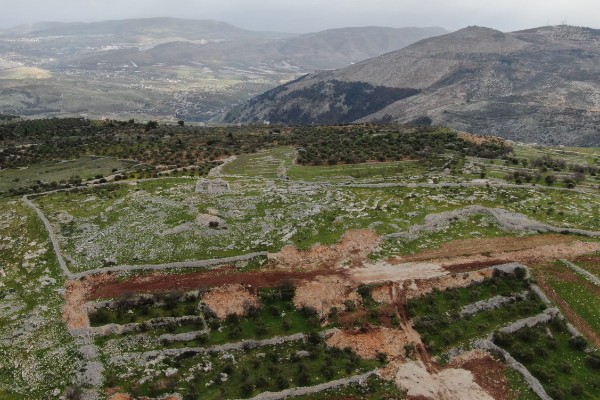PA claims the archaeological site is a “falsification of the Palestinian history of the place.”
By Aryeh Savir, TPS
Unknown individuals from the Palestinian Authority (PA) have again caused damage to the Biblical-era site of the Prophet Joshua’s altar on Mount Ebal.
The Book of Joshua describes how Joshua, the Israelite leader, built an altar on Mount Ebal, acting on instructions from Moses, after the nation crossed into the Land of Israel.
Haifa University archaeologist Adam Zertal has identified the remains of an altar found at the site as the one described in the Bible, where Joshua allotted the new land among the 12 tribes.
Zertal’s research showed the area to be a unique ritual site used to offer sacrifices. The dating of the altar to the period of the Israelites’ entry into the land, the similarity between the structure excavated and the altar described in the Torah, and the fact that only kosher animal bones were found at the site led the researchers to conclude that this is the altar of Joshua built on Mount Ebal.
The latest damage was discovered by volunteers of Shomrim Al Hanetzach, (Preserving the Eternal), a project dedicated to the preservation of the archaeological treasures situated throughout Judea and Samaria.
They reported damage to the altar’s walls and the falling of stones on its eastern side. Further damage was found in the surrounding part of the altar, in its southwest corner, as well as the collapse of the upper part of the wall. Further damage was found in the northeast corner of the altar where a collapse of the corner of the altar and a collapse at the foot of the structure was seen.
The organization notified the head of the Samaria Council, Yossi Dagan. In recent days Minister of Culture and Sports Hilli Tropper, visited the place together with Dagan, and said that that his office is promoting moves to increase the fight against the theft of antiquities and damage to archeological sites in Judea and Samaria.
Adi Shragai of Shomrim Al Hanetzach called on the Israeli government to “act as quickly as possible to prevent damage to the altar, which is in grave and immediate danger.”
“This is one of the most important sites for the Jewish people and hundreds of millions of Bible believers in the world. The writing is on the wall and we have warned about the high risk posed to the site, but no government official has so far taken responsibility.”
She pointed out that Prime Minister Naftali Bennett has stated that “the treatment of the altar is like that of the Western Wall. It is time to fulfill that promise.”
The PA has paved a road that passes near the site of the altar and is intended to connect the village of Asira ash-Shamaliya with Shechem. Part of the ancient fence that borders the site was dismantled and its stones were crushed using a gravel crusher to serve as a substrate for the paving of the road.
The site’s location in Area B, under PA administration, enables it to operate unhindered.
According to PA officials, identifying the site as an Israeli altar is a “falsification of the Palestinian history of the place” which they are acting to prevent.
The PA has previously considered labeling the area a Palestinian heritage site.
World Israel News staff contributed to this report.





